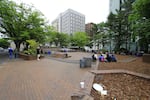
Portland City Commissioners consider an ordinance to spend $4.5 million to demolish O'Bryant Square in downtown. April 12, 2023
Kristian Foden-Vencil / OPB
Portland leaders voted on Wednesday to spend $4.5 million to demolish the square atop land that was the city’s first park.
O’Bryant Square, located at the intersection of Southwest Park Avenue and what’s now known as Southwest Harvey Milk Street, is listed as Park Block Number One on old city maps.
It was donated in the 1970s to the city, on the condition that a parking lot be built underneath.
In 1973, O’Bryant Square opened to significant fanfare, even though it was covered in bricks and concrete. People were impressed by its dual use as both a city park and an underground parking lot.
But over time, the garage started leaking, an old structural wall began to crumble and the fountain in the center of the square broke.
To compound those problems, the park design offered plenty of hiding places for people using illegal drugs or committing other criminal activity, leading some to derisively call it “Needle Park” and “Paranoid Park.”

O'Bryant Square, May 24, 2015.
Courtesy of Michael Hicks / Flickr
“O’Bryant Square has deteriorated to a point where the site presents a threat to public health, welfare and safety,” Mayor Ted Wheeler said on Wednesday.
O’Bryant Square has been closed and fenced off since 2018.
City leaders agreed on Wednesday to hire Northwest Infrastructure LLC to do the work. Crews will break up and remove the old concrete, then fill in the resulting hole to grade level. Grass will then be planted, and a mature ring of trees around the property is expected to remain.
In February, the Portland Parks Foundation announced a plan to redesign O’Bryant called “Back to Square One: Rethinking O’Bryant Square.” It will be run by the foundation in collaboration with Portland State University’s Center for Public Interest Design, Harvard University’s Loeb Fellows, and Portland Parks and Recreation Department.
“Historically we’ve always designed our urban plazas first, then brought the activities to them,” said Randy Gragg, the executive director of the Portland Parks Foundation and an alumnus of the Loeb Fellowship. “This time, we have the time and opportunity to learn from other cities, try things out, and let the successes determine the design.”
